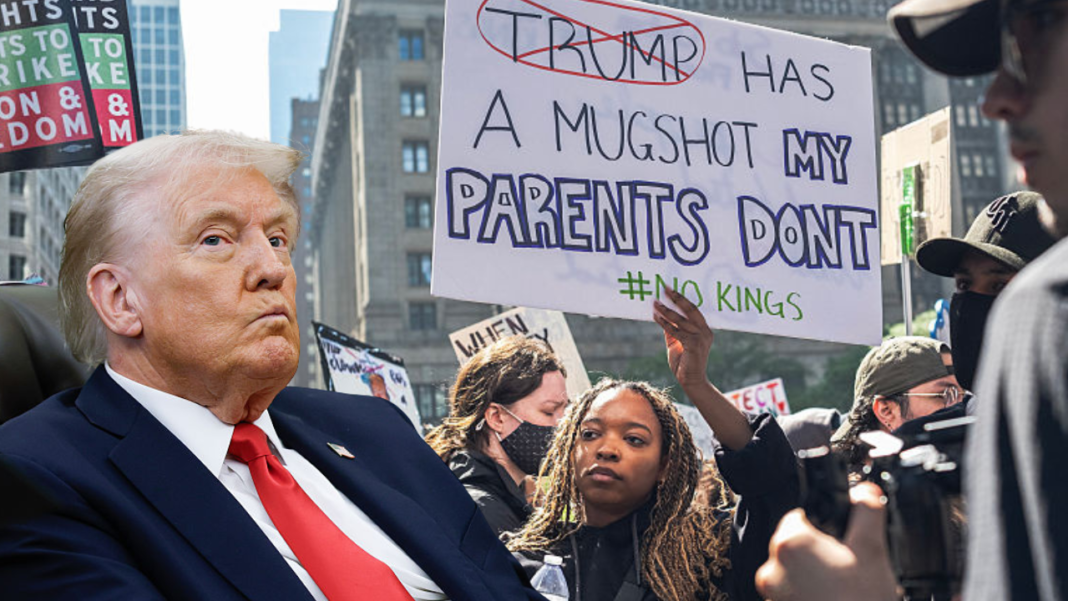Millions March for Change: “No Kings” Demonstrations Across America
On a day that resonates with historical significance, millions of Americans have taken to the streets for the “No Kings” mass demonstrations, voicing their discontent with President Donald Trump’s administration, which many critics describe as authoritarian and fascist. The demonstrations are set against the backdrop of the 30th anniversary of the Million Man March, underscoring a commitment to nonviolent protest in the spirit of the Civil Rights Movement, aimed at advancing Black equality.
A Call to Action
Angela Angel, a senior adviser for Black Lives Matter PAC, articulated the urgency of these gatherings. “We need to gather to remind each other that this is not normal, and that we still have the power to push back,” she explained. Her sentiment reflects the growing concern over what some perceive as a draconian governance style emanating from the Trump administration. “The federal government is operating in a state of fascism,” Angel expressed, highlighting alarming trends such as contempt for judicial precedents and undermining democratic norms.
The protests gain additional momentum from rising public outrage regarding several key actions taken by the Trump administration: the deployment of military troops to civilian areas, politically motivated indictments, and sweeping cuts to essential services like Medicaid and SNAP. Such measures disproportionately affect vulnerable communities, deepening societal divides and provoking widespread anger.
Patriotism in Protest
U.S. Representative Hakeem Jeffries from New York proclaimed, “What you’ll see this weekend is what patriotism looks like.” He asserted that the demonstrations represent a response to the extremism that has characterized Trump’s presidency and the Republican Party’s failure to fulfill its promise of reducing living costs for American families. The rhetoric of protest intertwines with themes of national identity, showcasing an active form of citizenship that refuses to accept the status quo.
A Legacy of Protest
Historically, protests have been instrumental during pivotal moments in American history, particularly within the Civil Rights Movement of the 1950s and 1960s. This era exemplified solidarity across various marginalized groups, uniting against racial discrimination and advocating for justice. Dr. David J. Johns, CEO of the National Black Justice Collective, highlighted that “protest is the language of the oppressed.” This historic perspective is particularly relevant today, as it frames current protests not merely as expressions of dissent, but as vital components of a functioning democracy.
Dr. Johns emphasized that many of the rights and advancements achieved in America came through persistent advocacy and demonstration. Figures like Dr. Martin Luther King, Jr., and Bayard Rustin carried forth a legacy of moral authority, pushing against barriers of injustice and inequality. These historical references provide a framework for contemporary movements, creating connective tissue between past struggles and current grievances.
Challenges in the Trump Era
In today’s political landscape, the “No Kings” movement emerges as a response to the authority Trump has wielded during his second term, often with little resistance from other branches of government. Congressional representatives such as Bonnie Watson Coleman have expressed grave concerns over the seeming capitulation of Congress and the Supreme Court to Trump’s presidency. With increasingly centralized power, the fear of losing democratic principles lingers heavy in the air.
Activists argue that the ongoing protests challenge the narrative framed by the administration, which often seeks to undermine dissent by branding it as terrorism or violence. Such tactics are seen as attempts to gaslight the public regarding the legitimacy of their grievances. By redefining protest as a negative action, there is a concerted effort to stem the tide of opposition.
Shared Struggles and Future Direction
In the climate of heightened tensions, advocates stress the importance of unity among marginalized groups. Angela Angel articulated the urgent need for solidarity, stating, “We are at war. We’ve been at war for a while.” From this perspective, collective action emerges as not just necessary, but essential for countering the strategies employed by the Trump administration to diminish dissent.
This call for collaboration among different movements echoes through the generations. The ongoing struggle for social justice reflects a persistence rooted in history, demonstrating the power of the people to challenge authority and demand equity. The radical spirit of protest persists as Americans align under the banner of “No Kings,” carving a path for change and renewal in the struggle for justice in contemporary society.
Through organized protests like “No Kings,” the fabric of American democracy is both tested and reaffirmed, with a plethora of voices joining in a singular cry for accountability, dignity, and justice. The echoes of the past resonate deeply today, reminding us that the fight for civil rights and equality is an enduring journey, one that calls for vigilance and active participation.



